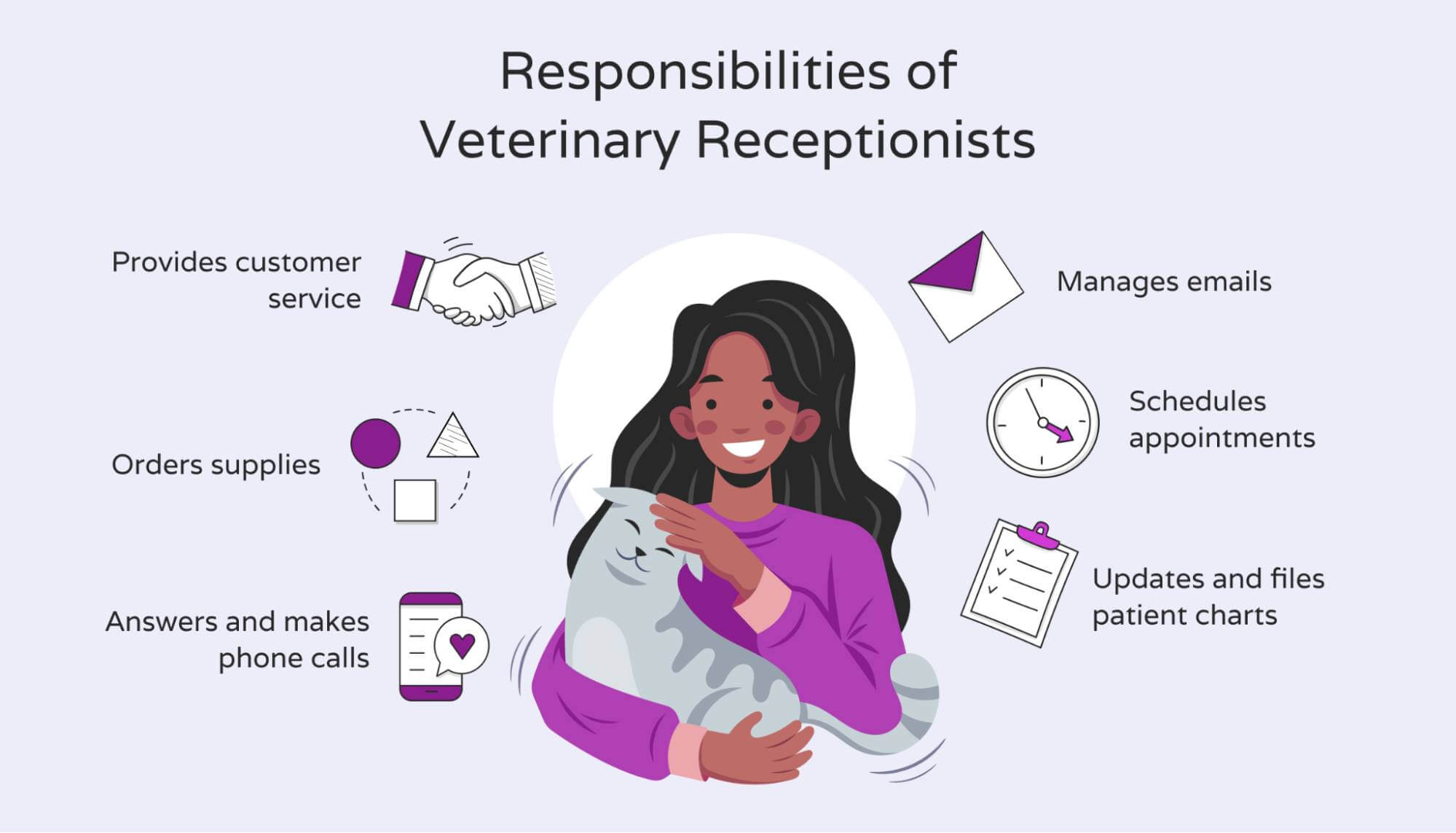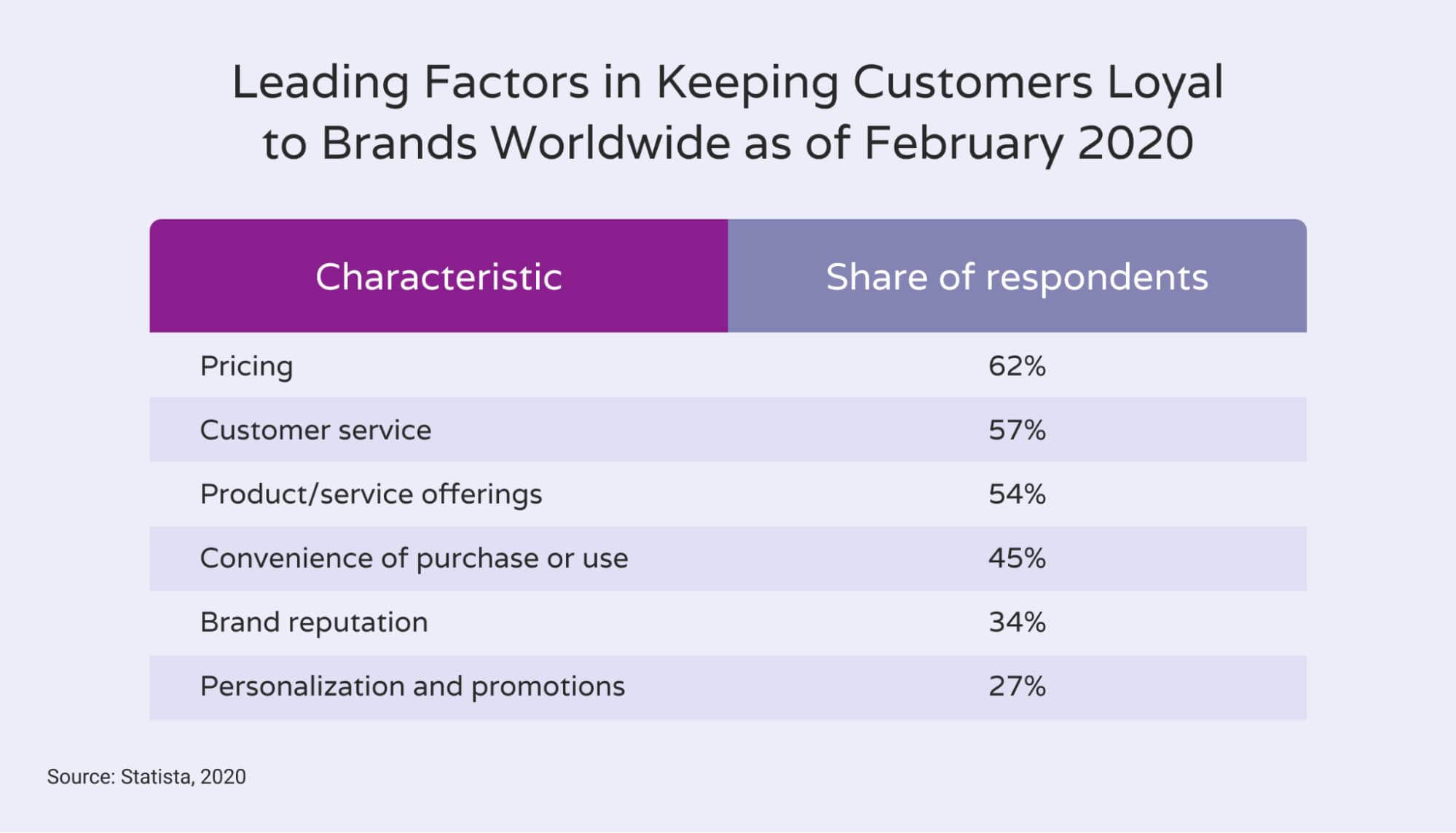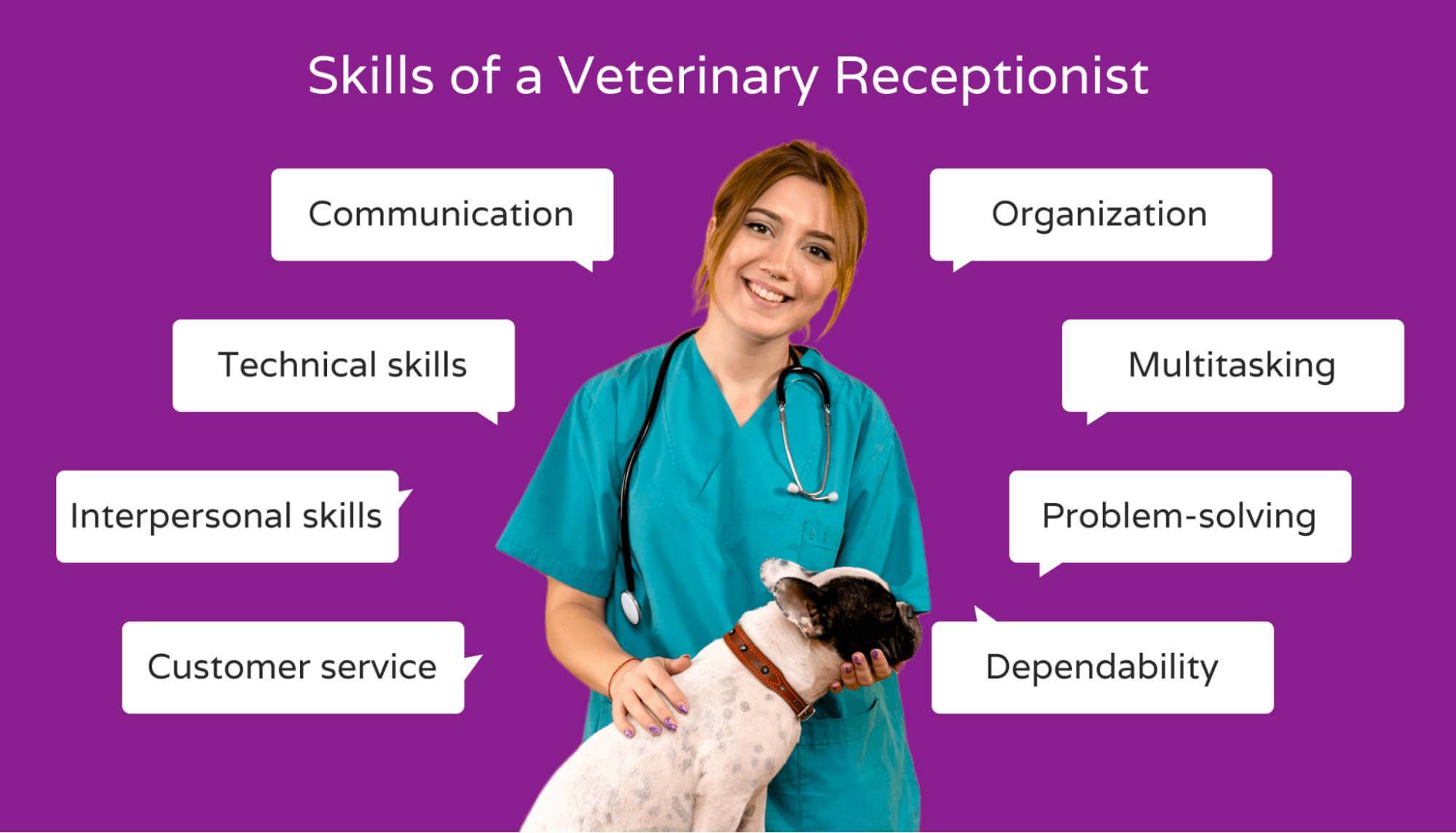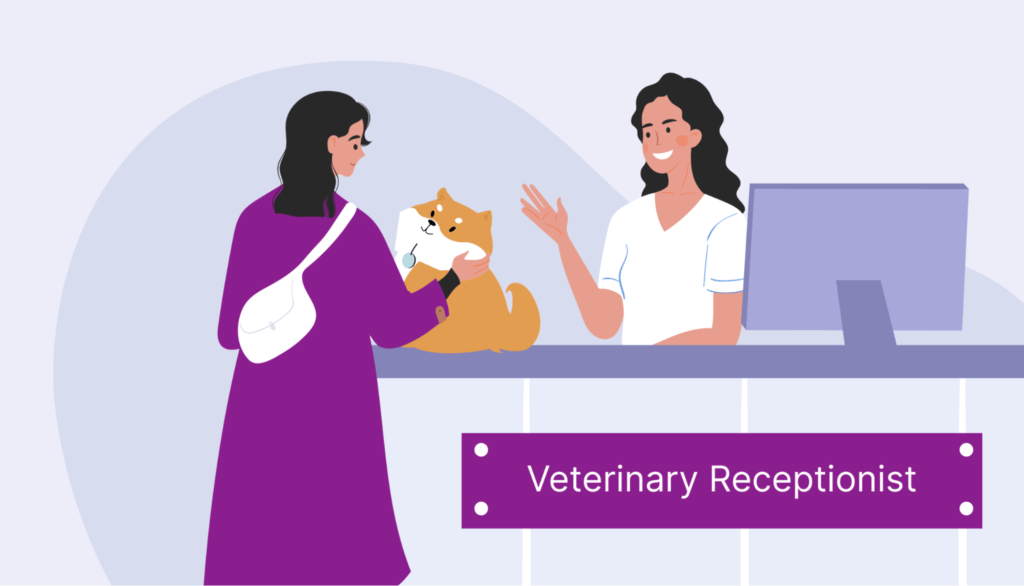When it comes to running a veterinary practice, there are many tasks that need to be performed on a daily basis. These include high-level tasks that require your expertise but also a lot of low-level tasks you don’t need to handle yourself.
You don’t have time to handle all of these tasks while giving your patients the best care possible and ensuring that they’re satisfied with your services.
Hiring a veterinary receptionist could help lighten the workload — so that you can finally focus on your clients and growing your practice.
This article will give you all the veterinary receptionist information you need, including what they are, what they do, how hiring one will benefit your practice, how much it’ll cost you to hire one, and more. Then you can decide if a veterinary receptionist is right for your practice.
What is a veterinary receptionist?
A veterinary receptionist is a receptionist who primarily specializes in working at a veterinary practice.
Most often, they can be found at the front desk of a vet and are responsible for interacting with and coordinating clients, helping with client queries, and communicating important information to the veterinarian and other staff members.

With receptionists being employed in nearly every industry, it’s easy to understand why an average of 134,000 openings for receptionists are projected each year.
Responsibilities of a veterinary receptionist
Some of the main responsibilities of a vet receptionist include:
Customer service: They need to provide exceptional customer service, such as greeting customers at the door, answering questions, handling client payments, and more.
Answering phone calls: They’re responsible for handling incoming and outgoing calls. Phone calls should be forwarded to the right person if they’re unable to help the client.
Scheduling appointments: Receptionists need to schedule appointments, keep the calendar up to date, and make sure that no double bookings are made.
Ordering supplies: They need to assist with pet supply purchases, grooming items, and supplements. Often, these purchases are made online.
Responding to emails: Receptionists need to answer incoming emails, write and send out emails to clients and suppliers, and make sure that mailboxes are up to date at all times.
Update patient charts: They need to keep patient files up to date and ensure that data is updated whenever changes occur — for example, client contact details, pet’s procedures, information, etc.

It may sound counterintuitive but most vet receptionist duties can be performed over the internet. As such, hiring a virtual veterinary receptionist is an excellent option, especially if you have a limited budget, or your practice is in an area with few qualified options.
Not only will they be able to perform all the necessary tasks, but they’ll do so at a far lower cost to you.
Veterinary receptionist education, training, and qualifications
Education and certification: A high school diploma or GED is usually enough. However, many employers prefer that the receptionist has a diploma or degree in a business, medical, or animal-related field.
Veterinary receptionists can also get a professional certificate through the American Animal Hospital Association (AAHA) — which can be completed in three semesters.
Training: Receptionists with a background working with animals may have a better chance of obtaining a vet receptionist position. Trainees usually go through significant practical training to become familiar with how a veterinary practice works and all its processes.
They may also receive training on certain software and programs that show them how to update the database, schedule appointments, handle payments, and more.
At Hello Rache, all our virtual receptionists have a foundation in a relevant medical field (in this case, veterinary) and HIPAA training.
Benefits of having a veterinary receptionist
Here are the four main benefits of having a veterinary receptionist to help you at your practice.
Saves time
Having a vet receptionist means that small, repetitive tasks that take up a lot of time will all be taken care of by the receptionist daily.
As a result, veterinarians will have more time to focus on more important tasks — such as giving adequate attention to their patients, networking with others in the industry, and working on strategies to grow their business.
They’ll also have a far better work-life balance, so they can spend some quality time with their family and friends instead of working late into the night trying to finalize these tasks.
Higher levels of productivity
Since the receptionist will take care of many tasks for you, your business processes will run far smoother. Client files will get updated faster, you won’t have to worry about supplies running out, and client payments will always be sorted.
As a result, the productivity levels of more expensive staff members and veterinarians will increase, and you won’t experience any bottlenecks that could deter the proceedings and overall growth of your practice.
Happier customers
With more time to focus on your patients, clients will feel valued. Additionally, your receptionist's swift responses and friendliness (over the phone and via email) will make your clients feel like your business cares about them and their pet’s well-being.
According to Statista, 57% of customers stay loyal to brands because of good customer service.

This means that the added value of exceptional customer service will help your practice gain authority in its industry — which will attract even more customers and keep them loyal to your business.
Less admin work
Your in-office administrative staff members will have more time to focus on high-level admin tasks since your receptionist will take care of the smaller tasks.
They will be able to do more of what they were hired to do in the first place.
This means that staff members won’t be overworked — resulting in higher productivity, increased job satisfaction, and higher retention rates.
How much will you have to pay a veterinary receptionist?
The average salary for a vet receptionist is $15.90 per hour or $48,044 per year. However, the salary that you need to pay your receptionist will depend on several factors, including location, level of experience, and skill set.
Hourly wage by location
Some of the highest-paying cities for veterinary receptionists in the U.S. are:
- Los Angeles, CA: $17.50 per hour
- Brooklyn, NY: $16.66 per hour
- Austin, TX: $16.52 per hour
- Charlotte, NC: $16.30 per hour
- Ventura, CA: $15.95 per hour
- Fort Worth, TX: $15.69 per hour
- Orlando, FL: $15.52 per hour
- Boca Raton, FL: $15.50 per hour
- Jacksonville, FL: $15.30 per hour
Veterinary receptionists in certain states also get paid more than the national average. For example, receptionists in Washington, Oregon, California, New Mexico, Indiana, New York, Maryland, New Jersey, Connecticut, and Massachusetts earn between 5%–14% more than average.
On the other end of the spectrum, receptionists in Montana, Nevada, Utah, Iowa, Wisconsin, Michigan, Kansas, Texas, Arkansas, Alabama, Florida, Tennessee, Kentucky, Ohio, North Carolina, and South Carolina earn between 5%–14% less than average.
By hiring virtually, you can access experienced talent outside the country, which makes hiring a receptionist a lot more affordable. For example, our highly-trained virtual receptionists (with medical backgrounds) will cost you under $10 per hour, because they are based in the Philippines.
Hourly wage by level of experience
Veterinary receptionists’ salaries can also increase based on their level of experience. For example, receptionists with 10–19 years of experience can earn around $2.50 more per hour than those with less than a year of experience.
This may not seem like much. However, if you do the math, this means that you’ll be paying those with experience around $20 more per day and $400 more per month.
Hourly wage by skill set
Certain skill sets can also have an impact on how much you’ll need to pay a receptionist. For example, veterinary receptionists with medical terminology skills can earn 5% more than average.
Similarly, those with excellent customer relations skills can also earn around 5% more, and those with records management skills can earn up to 3% more.
At Hello Rache, we charge a flat fee of $9.50 per hour for our virtual veterinary receptionists — no extra costs for experience, skill set, location, or even overtime.
Other common benefits of veterinary receptionists
In addition to a salary, here are some other benefits that you need to consider when hiring a veterinary receptionist.
- 401(k)
- AD&D insurance
- Dental insurance
- Disability insurance
- Employee assistance programs
- Employee discounts
- Health insurance
- Health savings account
- Life insurance
- Paid holiday
- Paid time off
- Parental leave
- Referral programs
- Retirement plan
- Training
- Tuition reimbursement
- Uniform allowance
- Vision insurance
There may be other benefits as well — especially when hiring an in-office receptionist who works full-time.
How much do similar professions get paid?
Here’s a list of some other similar professions and how much they earn per hour in the United States.
- Customer service representatives: an average of $17.30 per hour
- Receptionists: an average of $15.50 per hour
- Personal assistants: an average of $15.63 per hour
- Administrative assistants: an average of $16.99 per hour
- Medical receptionists: an average of $16.67 per hour
Skills to look for when hiring a veterinary receptionist
Here are some essential skills to look out for when hiring a vet receptionist for your practice.

Communication
Your veterinary receptionist needs to be great at both verbal and written communication since they’ll need to answer phone calls and emails daily. Alongside communication abilities, they’ll also need good listening abilities.
Multitasking
They need to be able to multitask as they’ll be handling several tasks simultaneously and will often need to communicate with clients while they’re busy with other work. For example, they’ll likely have to hold several lines, handle filing duties, and schedule appointments at the same time. As such, they need to be able to shuffle tasks around without panicking or burning out.
Organization
A stellar veterinary receptionist should have great organizational skills and know how to prioritize tasks. They need to be able to find files and data at a moment’s notice whenever the veterinarian or any other staff member requires it.
Customer service
Alongside great communication skills, the receptionist also needs to have excellent customer service skills. This way, they can assist customers with their queries, payments, bookings, and make them feel at ease and appreciated. On top of this, they need to be able to forward queries to the right personnel whenever they don't have the means to help the customer.
Technical skills
They should know how to use phone systems, cloud-based apps, copiers, and computers. Knowing how to use word processing software and email systems is also a must since they’ll be spending a lot of time communicating with customers and suppliers and typing up documents.
Ability to stay calm during stressful situations
When customers call with an urgent problem or emergency, they need to be able to handle the situation in a calm manner. They also need to stay attentive and friendly toward the customer at all times — even when the customer is angry or agitated.
Dependability
Since receptionists interact with nearly every customer — whether over the phone, face-to-face, or by email, they need to be dependable. Customers, suppliers, and staff members must be able to reach the receptionist during operating hours. The veterinarian must also be able to rely on the receptionist at all times.
Interpersonal skills
It can be extremely sad when a pet passes away. Veterinary receptionists need to be able to comfort the customer and show compassion. They need to have good people skills and know how to react to sad and happy moments.
Hire a veterinary receptionist today
Hiring a veterinary receptionist for your practice will help lighten the workload and increase customer satisfaction. It’s up to you to choose which option suits your practice best — virtual or office-based.
Virtual receptionists are a great option if you have a limited budget, you only need part-time help, or if you’re struggling to find the right talent in your area.
Thinking of hiring a veterinary assistant? Head over to the ultimate guide to hiring a veterinary assistant.




